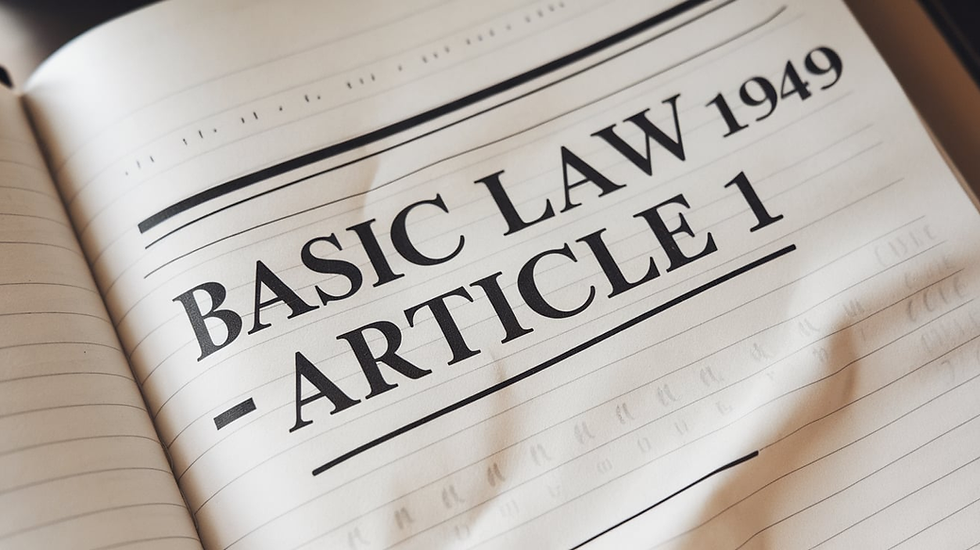Basic Law 1949 | Article 2
- WLD Team

- Dec 25, 2025
- 4 min read
The Basic Law for the Federal Republic of Germany (1949) is more than a constitution—it is the safeguard of democracy and individual freedom.
After Article 1 places human dignity at the highest level, Article 2 builds upon it by guaranteeing personal freedoms and general rights. It protects liberty, development of personality, and the right to life and physical integrity.
At the same time, it sets clear limits: freedom must respect the rights of others, the constitutional order, and moral law. This balance ensures that Germany is both a free and orderly state, where rights and responsibilities work together.

Basic Law 1949 Article 2 – The Text
Article 2 of the Basic Law (1949) states:
“Every person shall have the right to free development of his personality insofar as he does not violate the rights of others or offend against the constitutional order or the moral law.”
“Every person shall have the right to life and physical integrity. Freedom of the person shall be inviolable. These rights may be interfered with only pursuant to a law.”
This means:
Individuals are free to shape their lives and make choices.
Freedom is not unlimited—it must respect others and follow the law.
The state must protect life and physical safety.
Any restriction of freedom requires a legal basis.
Basic Law 1949 Article 2 – Importance
Article 2 is one of the most cited provisions in German constitutional law. Its importance comes from:
Guaranteeing Liberty: It ensures people can make personal choices about lifestyle, beliefs, and development.
Protecting Life and Safety: It provides constitutional protection for health, safety, and bodily integrity.
Defining Limits: Freedom is balanced with responsibility to society.
Judicial Oversight: Courts use Article 2 to strike down unfair restrictions on freedom.
Without Article 2, the Basic Law would lack a clear statement of individual liberty, making democracy weaker.
Basic Law 1949 Article 2 – Right to Free Development of Personality
The first part of Article 2 gives everyone the right to develop their personality freely. This covers:
Education and Career Choices: Citizens can choose professions, studies, and lifestyles.
Expression of Identity: People may express beliefs, culture, and individuality.
Private Life: Individuals decide how to live, as long as they do not harm others.
For example, a person is free to dress as they wish, follow any religion, or pursue creative work. But if these actions harm others or violate laws, limits may apply.
Basic Law 1949 Article 2 – Right to Life and Physical Integrity
The second part of Article 2 protects:
Life: The state must safeguard life, meaning it cannot arbitrarily take it away.
Physical Integrity: Citizens are protected from bodily harm, torture, and degrading treatment.
Health Protections: The state must ensure basic healthcare and safety standards.
For instance, laws on medical treatment, public health, and workplace safety are grounded in this constitutional duty to protect life and integrity.
Basic Law 1949 Article 2 – Freedom of the Person
Article 2 declares that freedom of the person shall be inviolable. This refers to personal liberty, including:
Protection against arbitrary arrest or detention.
Freedom of movement within Germany.
The right to travel and relocate.
However, this freedom may be restricted by law, such as in cases of criminal investigation or quarantine during health emergencies. Importantly, restrictions must always be lawful and proportionate.
Basic Law 1949 Article 2 – Limits on Freedom
Freedom is not absolute. Article 2 sets conditions:
Respect for Rights of Others: One person’s freedom cannot destroy another’s rights.
Constitutional Order: Actions must comply with democratic principles and laws.
Moral Law: Certain limits protect public order and ethical standards.
For example, freedom of expression does not allow hate speech that violates another’s dignity. Courts balance these conflicts under Article 2.
A Practical Example of Basic Law 1949 Article 2
A well-known example is the German Constitutional Court’s 1975 decision on abortion. The Court ruled that the state must protect unborn life under Article 2’s right to life, but also consider the mother’s right to personal freedom. This balance led to laws allowing abortion only under specific conditions.
Another case involved surveillance laws: the Court ruled that excessive data collection violated Article 2’s guarantee of personality development and privacy.
These examples show how Article 2 directly shapes law and everyday freedoms.
Basic Law 1949 Article 2 – Connection to Human Dignity
Article 2 is closely tied to Article 1 on human dignity. While Article 1 establishes dignity as inviolable, Article 2 translates it into practical rights: liberty, life, and personal safety. Together, they form the core of Germany’s constitutional protections.
Conclusion
Article 2 of the Basic Law (1949) is one of the most powerful guarantees of freedom in Germany. It gives every person the right to develop their personality, protects life and physical integrity, and secures personal liberty. At the same time, it ensures that freedom is balanced with the rights of others and the constitutional order.
Courts have repeatedly used Article 2 to protect citizens against unfair restrictions, making it a living expression of German democracy. In essence, Article 2 is the bridge between human dignity and personal liberty.
FAQs
What does Article 2 of the German Basic Law say?
It guarantees the right to free development of personality, life, physical integrity, and personal liberty. These rights may only be limited by law.
Why is Article 2 important in the Basic Law?
It is important because it protects personal freedom, life, and safety while balancing these with the rights of others and society. It is central to German constitutional law.
Can the state restrict freedoms under Article 2?
Yes, but only by law and only if necessary to protect others, the constitutional order, or moral law. Restrictions must always be proportionate.
How does Article 2 affect everyday life?
It protects choices in education, career, religion, and lifestyle. It also ensures safety through health laws, bans on torture, and rules against unlawful detention.
Is Article 2 connected to Article 1 of the Basic Law?
Yes. Article 1 protects human dignity, and Article 2 guarantees freedoms that make dignity real. Together, they form the foundation of individual rights in Germany.

Comments